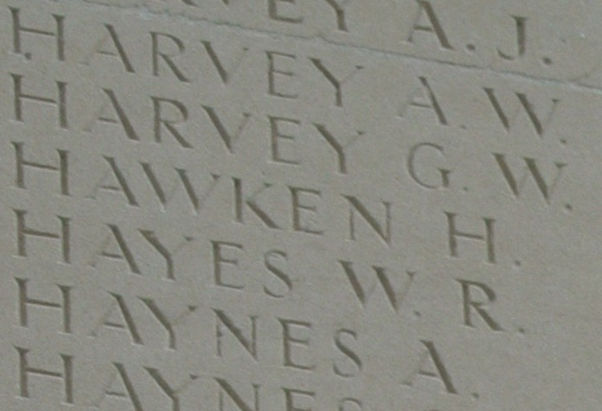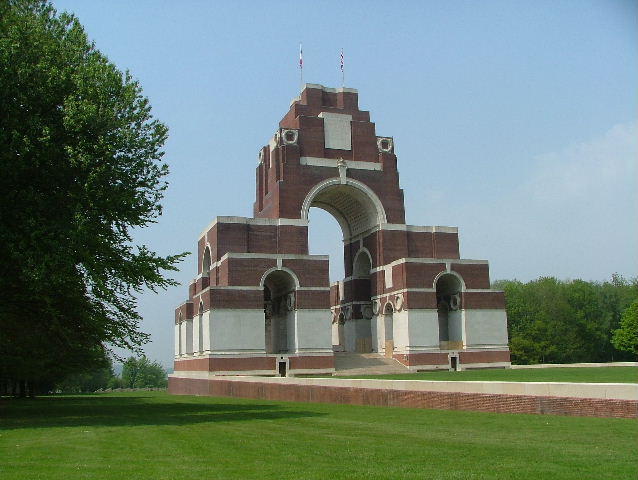Name
Horace Hawken
Conflict
First World War
Date of Death / Age
25/09/1916
Rank, Service Number & Service Details
Private
15675
Bedfordshire Regiment
8th Bn.
Awards: Service Medals/Honour Awards
Not Yet Researched
Cemetery/Memorial: Name/Reference/Country
THIEPVAL MEMORIAL
Pier and Face 2 C.
France
Headstone Inscription
NA
UK & Other Memorials
Standon War Memorial,
St Mary’s Church Memorial, Standon,
Puckeridge Memorial Plaque, Standon Village Hall, Standon
Wartime Service
Biography
Private No. 15675 with the 8th Battalion, Bedfordshire Regiment. Horace Hawken was killed in action 25th September 1916 and his body was never identified.
Born 1892/3 in St. Kew, near Bodmin in Cornwall, son of Horace and Mary Hawken. Horace’s grandfather was an Innkeeper (The St Kew Inn) and we do not yet know why the Hawken’s moved half way across the country to Standon. The family ran, or owned (not yet established), Town Farm in Standon. The family consisted of seven surviving children, two having died at a young age. The first four children were born in Cornwall, the remaining children were born locally, in Braughing and Standon, which tells us they were first in the area between 1893- 1899.
The five sons all helped their parents at Town Farm, and at least three, possibly four, were in the Army at some point during the 1st World War.
Horace enlisted at Hertford into the same regiment as the Clements brothers, probably on the same day, so it is perhaps no surprise that Horace and ‘Clarry’ Clements also died on the same day.
An article in the Herts and Essex Observer dated 11th November 1916 mentions both Horace and Clarry Clements as ‘missing’. It states:
STANDON – Two Standon Soldiers Missing
Private Ernest Clarence Clements and Private Horace Hawken, both belonging to the Bedfordshire Regiment, have been officially reported as missing since the engagement on September 25th last. Both enlisted at the commencement of the War and have done good service at the front for some time. Their last communications home were sent a day or two before September 25th and their parents have heard nothing further to alleviate their anxiety. Mr & Mrs Clements have another son in the same Regiment, who is now in hospital in England and Mr & Mrs Hawken have three other sons in the Army, both families having responded with alacrity to the nation’s call.
The Battalion were transferred to 6th Division and spent many months in the trenches N.E. of Ypres. Another soldier's letter home (E C Clements) describes an uncomfortable Christmas Day carrying rations back and forth between a ruined village and frontline trenches, whilst eating bread and butter for his own meals, tea without milk, and having a spot of jam with his bread for dinner. He remarks on being upset because a friend called ‘Punch’ had been killed a few days earlier. ‘Punch’ was in fact Private 15306 Francis W Oakley who was another of the local lads that had enlisted the same day.
Until April 1916 the brothers spend a quiet if uncomfortable time in the trenches, and both survived a German raid on 19th April which caused about 200 casualties in the hand to hand fighting in the dark. Following this incident they settled back into trench warfare until the Somme campaign in September.
On 15th September the battle of Flers-Courcelette opened, tanks, being used for the first time, got bogged down, and the British artillery fell short, resulting in the wire being uncut along their portion of the line. The attempt to get through the wire under heavy machine gun fire resulted in great loss of life, following which they were rotated back out of battle to regroup.
On the 25th September 1916 the 6th Division were again in action at the Battle of Morval, which saw Horace and the Bedfords in reserve after sustaining huge casualties the week before. Although in reserve the Battalion provided carrying parties for those in the front line, and suffered from shelling.
Almost 30 were killed and twice as many wounded, one of which was Horace.
It is hard to imagine how the families coped living day to day knowing that several of their sons were in constant danger and perhaps would not return home.
Acknowledgments
Jonty Wild
Di Vanderson, Jonty Wild, www.bedfordregiment.org.uk



